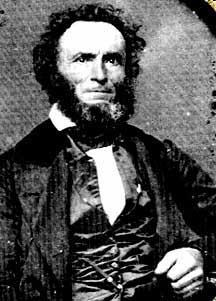Giessen emigration society
The " Gießener Emigration Society " was a colonial society founded in Gießen in 1833 by Paul Follen and Friedrich Münch , which wanted to found a new and free "German colony" in North America in the 1830s .
history
Westphalian and Hanoverian small farmers and farm workers had already emigrated to the American state of Missouri . One of these emigrants was the doctor Dr. Gottfried Duden (1785-1855), who found a lot of attention with his experience reporting in Germany and was able to sell his book in very large print runs ( report on a trip to the western states of North America and a multi-year stay at the Missouri in the years 1824-1827 , Elberfeld 1829). Among other things, the founding of the "Giessener Emigration Society" was a consequence of Duden's America advertising.
In 1833 the Hessian court attorney Paul Follen (also: Follenius ; 1799–1844), brother of the scholar and writer Karl Follen (1796–1840), and his brother-in-law, Pastor Friedrich Münch (1799–1881), founded this "Gießen Emigration Society" which in 1834 alone brought over 500 people who wanted to emigrate to America in two transports. With this society, the aim was not only to help those willing to emigrate, but above all to found a new and free German state in North America, “ which of course would have to become a member of the United States, but with the maintenance of a form of government that would ensure the continued existence of German civilization and the German language and should create a real, free and popular life. "
However, organizers and emigrants alike were largely ignorant of the country and its population, as well as the lack of political will, but also the exaggerated romanticism of the colonial era, which was the reason why all idealistic projects soon had to fail. Follen and Münch also found a "German colony" in Missouri in the summer of 1834, which was called the " Latin Settlement ". Münch later referred to them as a “ party of Westphalian hiring people ” who had made a makeshift arrangement, a “ colorful aristocracy ”, consisting of German counts, barons, scholars, preachers, economists, officers, business people, students, etc., the others with fewer resources and “ only partially willing to accommodate themselves to the demands of life there. "
Biographies
However, some biographies were exceptions: Paul Follen became a farmer and writer in Dutzow (Missouri). Friedrich Münch also became a farmer, then an MP and influential founder of the Republican Party . He was elected to the Missouri Senate and was a staunch fighter for the liberation of slaves . As a settler, Münch opened up extensive, self-contained German settlement areas west of St. Louis . Münch's descendants gained prosperity and reputation there over the years.
Exhibition trip
180 years after its founding, the exhibition in CZ (culture center) in Giessen Dawn of utopia - exhibition in the footsteps of a German Republic in the US showed that followed in Bremen , Washington, DC and St. Louis , Missouri to see will be.
See also
- History of the Germans in the United States
- The "thirties", political refugees of the 1830s
- Mainz aristocratic association
literature
- Gottfried Duden: Report on a trip to the western states of North America and a stay of several years on the Missouri . Lucas Verlag, Elberfeld 1829 (digitized version)
- Paul Follen: Request and explanation regarding a large-scale emigration from Germany to the North American Free States .
- Friedrich Münch (Ed.): Memories from Germany's most gloomy times, depicted in the life pictures of Karl Follen, Paul Follen and Friedrich Münch , St. Louis (Missouri) and Neustadt a. d. Haardt 1873.
- Jörg Nagler : Münch, Friedrich. In: New German Biography (NDB). Volume 18, Duncker & Humblot, Berlin 1997, ISBN 3-428-00199-0 , p. 518 f. ( Digitized version ).
